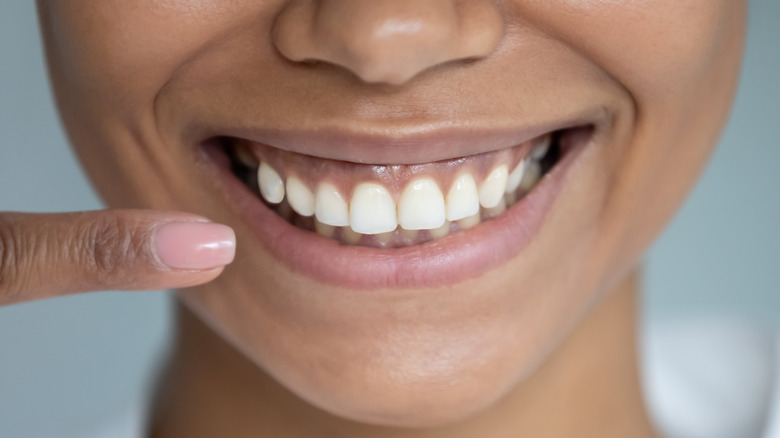The Secret To Better Oral Health, And It's Not Flossing
While there are steps we can take to improve our oral health, there is one important and little-known way to take care of our teeth that works from the inside out: vitamin D, as per MindBodyGreen. This vitamin serves multiple functions in the body, including making our teeth stronger and healthier by aiding in the body's absorption of calcium, a critical mineral for bone health. Although teeth are not technically bones, they undergo a continual mineralization process that requires the same minerals found in bones.
A 2020 study published in Nutrients looked at the effects of vitamin D deficiency on oral health. It suggested that certain oral diseases are influenced by a lack of vitamin D, namely cavities, periodontitis, and defects in enamel. Vitamin D is important for more than just the health of our teeth — it also keeps the periodontium healthy (via MindBodyGreen). The periodontium, which is comprised of the gums and bones surrounding the teeth, ensures that your teeth are properly rooted in your gums while adding a protective layer against harmful bacteria. The results of a 2017 study published in the Journal of Clinical Periodontology indicated that vitamin D deficiencies can contribute to inflammation of the periodontium, which in turn destroys this crucial oral structure.
WebMD points out that the vitamin D recommendation for adults under age 70 is 600 IU/day, while those over this age should shoot for 800 IU/day. To ensure you're getting enough of this vitamin, you should combine diet with supplementation.
Other ways to improve your oral health
In addition to getting enough vitamin D on a daily basis, there are other important steps you should be taking to optimize your oral health. While brushing your teeth may be an obvious one, Healthline explains the importance of making sure you are brushing correctly. You should brush each tooth slowly while moving the toothbrush in a circular motion to get rid of accumulated plaque that can potentially lead to gum disease. In conjunction with proper tooth brushing, you should also have fluoride toothpaste on hand. Fluoride not only protects the enamel on our teeth, but also kills germs that contribute to tooth decay. In fact, an article on fluoride and oral health published in the Community Dental Health Journal in 2016 confirmed the importance of this mineral in preventing cavities.
Flossing is one more action you can take to prevent painful trips to the dentist (via Healthline). "It's really a way to stimulate the gums, reduce plaque, and help lower inflammation in the area," Jonathan Schwartz, DDS, told Healthline. Flossing removes around 40% of the plaque that gets stuck to your teeth, as per WebMD. Technique is also important — aim for moving the floss up and down while also wrapping it around the base of each tooth.
One more key component of oral health is paying attention to your diet (per Healthline). You should be drinking plenty of water every day and minimizing your intake of sugary and acidic foods.


